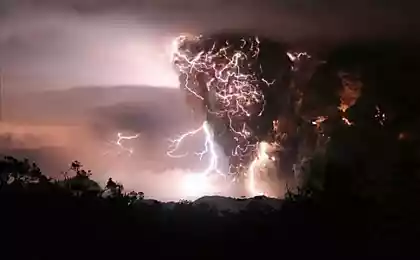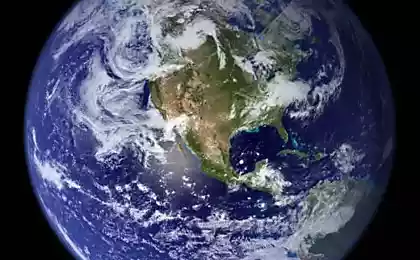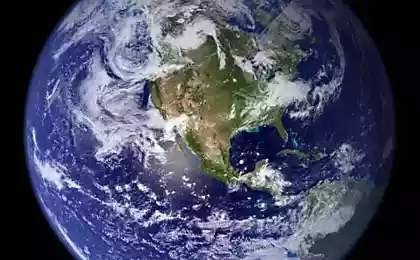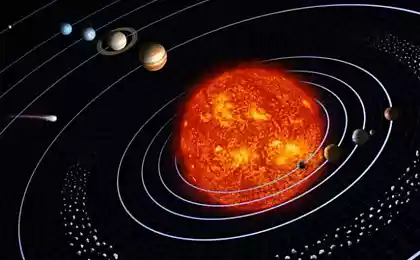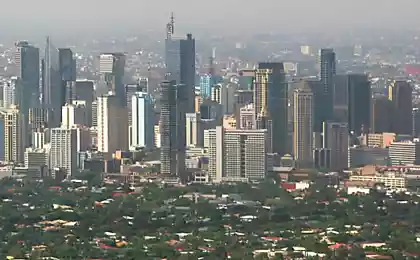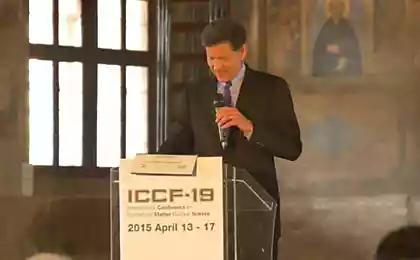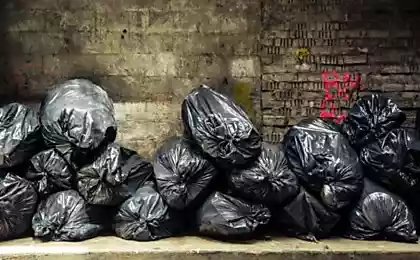454
Christian Lagunas: Pollution of the planet is due to our desire for comfort
The idea of green architecture or so-called green building (buildings are designed in such a way as to have minimal impact on the environment) is becoming increasingly popular. What experts think about it? We talked with Serbian architect Christian Lajeado, which last 10 years living and working in Moscow.
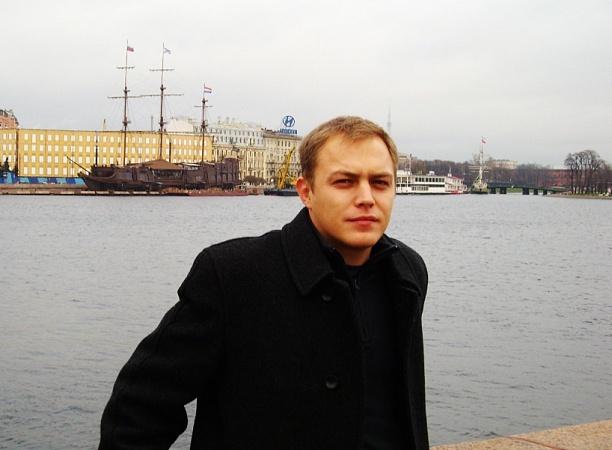
Christian: "All architects think they are gods. Doctors – the lords of life and death. A good doctor can extend your life was bad to kill you. And the architect thinks: if I build well, design beautiful buildings and entire cities, there will be live happy and healthy people...
In General, modern trends in architecture contradictory. Is Europe, which is trying to reduce the effects of environmental disasters happening around the world. For example, in the Pacific ocean floats an island of plastic bottles in size with the American state of Texas. And it is unclear what to do with it. Plastic is already included in the food chain, fish eat the plastic, people eat fish and plastic.
In England, for example, passed a law which sets the limit of energy consumption for each building: if you exceed, you pay a fine. On the one hand, in our society, capitalism, which tells you: "Spend more! Buy more! Consume more garbage!", on the other – a kind of eco-hysteria: "We have to live environmentally friendly and save our planet!". And contrary to one another. All of the European "healthy architecture" of the penalty. Because the money needed for the construction of one environmentally friendly home in Europe, it is possible to build no less than a thousand houses for the local population in Africa.
Suppose: there is a project that not only consumes less energy and does not produce garbage, but even improves the environment. Each house has a plot where a farmer is growing food for themselves in an ecologically friendly manner. The purpose of these projects is to transform the world as such. When all will live in such conditions and eat normally, it, according to developers, will lead to so-called positive utopia. The cost of such a project – about 500 euros per square meter for a customer not less than 1000 euros per square. According to developers, if at least one person in the village will live in this house, his neighbors think, "Maybe this is right? Let's all begin to live like this?". And in the end, after 500 years all of Europe will be environmentally friendly, renewable (although Africa and India are starving)... In any case, this scheme does not work. People with average incomes will never buy a house".
But in the past, without technology, people lived and worked out of the debris in smaller amounts. And housing was cheaper — for example, in the village. However, it was not so comfortable...
Yes, in this case, in comfort. Now strap the required level of comfort it has risen. Before there was a hearth with a lively fire, a couple of chairs. And now – heated, different bells and whistles, a light that responds to voice. Need absolute comfort but with less power. By and large, pollution is due to our desire for comfort.
You just have less comfort in life?
Maybe, maybe. But here there is no return. Everyone seeks for comfort. Who once felt the warm water in the bathroom, no longer wants to bathe in cold. It is a vicious circle from which there is no exit. And we all live in it.
And what will happen next? What are the forecasts?
A very dark picture indeed. The number of people increases...
Underground people will live, do you think?
Currently in Japan, there is a Hyper-expensive project: the city inside the sea.
Originally it was created due to lack of space?
Yes, this project pays for itself – it is also the exclusive "for those who want to live at the bottom of the ocean." The city will be completely environmentally friendly – renewable, will not produce emissions, with its microclimate. Residents something will grow, something to get out of the sea. It is a utopian project, but there are so many stakeholders. They say it is really built. The Japanese have advanced technology, and it is very important to the future world respectful of the planet. That such a city will cost billions and billions – not so important. Importantly, the humanity began to treat the Earth with respect.
Actually, it's quite an old idea in architecture, to nature went into the house and out of it – no border between internal and external space. It should be environmentally friendly. A lot of glass, same temperature outside and inside – in short, everything that a person does not feel cut off from nature. But... nothing happens, because we have a lot of garbage, spend a lot of electricity and I love to be in an enclosed space. In the bedroom area of more than 20 m people already feel uncomfortable, so early in the palaces did the canopies. You're in bed for a canopy, "in the house." We want to isolate yourself from the outside world, because he is a threat.
The whole human story about how people protected themselves from nature. Hiding from the cold, from moisture, from animals, from poisonous plants. And so we in the 21st century opened up to nature – it will not work. We've conquered nature is our greatest achievement so far. All. While the perfect architecture is the wall, a small window, warm and safe. This is the meaning. We are afraid of. Afraid of strangers. I'm afraid of stray dogs on the street, afraid of everything. But a home is a place where it's safe. We have not reached such a level of the psyche, to so openly go to the nature.
Let's get back to today's realities. What solution do you see for Moscow? In such a state as it is now: metro, tube...
We need such atmosphere, such a economic climate, so people have no need to pile in Moscow, to other regions have been with the same salaries and with the same conditions. Then people will start to "disappear". There are few who gets a thrill out of life. Just tied to a good economy. Because the flow of money that passes through Moscow, a huge.
What is needed for the development of regions? Why not do it?
I don't know. That is another question... In Moscow and infrastructure, and all. As said by Pedro Almodovar: "I Want to be a famous Director – first you have to know where the capital. The second step is to get to the capital. And only then you can become a famous Director." Here's how it works in the world at the moment. It is cheaper to expand a large metropolis than a village, normal town. Again a question of money. All look like to do less. In fact, the costs are enormous.
At some point we get to a certain point that even on the bottom to expand in Moscow?
Not only in Moscow, everywhere in the world. But I don't know what would happen. People will constantly piling up, piling up, and there will be some kind of great revolutionary upheaval on a world scale, or some dreadful disease foci which will be in the big cities. This will force people to leave the cities. When was the plague in Europe, the foci were in the big cities. Crowds of people ran to the manor. But it's terrible, of course. Say, a maximum of thirty years will start in the world the problem of hunger and water. It will not be enough food for everyone, because we are now seven billion and will be nine. Not to be missed physical resources. And then something has to change. When a person is hungry, there is already a change was necessary. They say the revolution in St. Petersburg in 1905, may not have happened had not stopped the train, carrying loaves of bread in the city. Then people just started to RAID the bakeries in St. Petersburg, and then it all went on. Hunger is of great importance.
What do you see as the solution to prevent this?
Not see. Just need to wait and be ready. Find new aesthetics of the new world. I'm not afraid of change. That's all. published
Talked Masha Sarafanov
P. S. And remember, only by changing their consumption — together we change the world! ©
Source: vegetarian.ru/interview/arkhitektor-kristian-ladzhevats-zagryaznenie-planety-proiskhodit-iz-za-nashego-stremleniya-k-komfort.html

Christian: "All architects think they are gods. Doctors – the lords of life and death. A good doctor can extend your life was bad to kill you. And the architect thinks: if I build well, design beautiful buildings and entire cities, there will be live happy and healthy people...
In General, modern trends in architecture contradictory. Is Europe, which is trying to reduce the effects of environmental disasters happening around the world. For example, in the Pacific ocean floats an island of plastic bottles in size with the American state of Texas. And it is unclear what to do with it. Plastic is already included in the food chain, fish eat the plastic, people eat fish and plastic.
In England, for example, passed a law which sets the limit of energy consumption for each building: if you exceed, you pay a fine. On the one hand, in our society, capitalism, which tells you: "Spend more! Buy more! Consume more garbage!", on the other – a kind of eco-hysteria: "We have to live environmentally friendly and save our planet!". And contrary to one another. All of the European "healthy architecture" of the penalty. Because the money needed for the construction of one environmentally friendly home in Europe, it is possible to build no less than a thousand houses for the local population in Africa.
Suppose: there is a project that not only consumes less energy and does not produce garbage, but even improves the environment. Each house has a plot where a farmer is growing food for themselves in an ecologically friendly manner. The purpose of these projects is to transform the world as such. When all will live in such conditions and eat normally, it, according to developers, will lead to so-called positive utopia. The cost of such a project – about 500 euros per square meter for a customer not less than 1000 euros per square. According to developers, if at least one person in the village will live in this house, his neighbors think, "Maybe this is right? Let's all begin to live like this?". And in the end, after 500 years all of Europe will be environmentally friendly, renewable (although Africa and India are starving)... In any case, this scheme does not work. People with average incomes will never buy a house".
But in the past, without technology, people lived and worked out of the debris in smaller amounts. And housing was cheaper — for example, in the village. However, it was not so comfortable...
Yes, in this case, in comfort. Now strap the required level of comfort it has risen. Before there was a hearth with a lively fire, a couple of chairs. And now – heated, different bells and whistles, a light that responds to voice. Need absolute comfort but with less power. By and large, pollution is due to our desire for comfort.
You just have less comfort in life?
Maybe, maybe. But here there is no return. Everyone seeks for comfort. Who once felt the warm water in the bathroom, no longer wants to bathe in cold. It is a vicious circle from which there is no exit. And we all live in it.
And what will happen next? What are the forecasts?
A very dark picture indeed. The number of people increases...
Underground people will live, do you think?
Currently in Japan, there is a Hyper-expensive project: the city inside the sea.
Originally it was created due to lack of space?
Yes, this project pays for itself – it is also the exclusive "for those who want to live at the bottom of the ocean." The city will be completely environmentally friendly – renewable, will not produce emissions, with its microclimate. Residents something will grow, something to get out of the sea. It is a utopian project, but there are so many stakeholders. They say it is really built. The Japanese have advanced technology, and it is very important to the future world respectful of the planet. That such a city will cost billions and billions – not so important. Importantly, the humanity began to treat the Earth with respect.
Actually, it's quite an old idea in architecture, to nature went into the house and out of it – no border between internal and external space. It should be environmentally friendly. A lot of glass, same temperature outside and inside – in short, everything that a person does not feel cut off from nature. But... nothing happens, because we have a lot of garbage, spend a lot of electricity and I love to be in an enclosed space. In the bedroom area of more than 20 m people already feel uncomfortable, so early in the palaces did the canopies. You're in bed for a canopy, "in the house." We want to isolate yourself from the outside world, because he is a threat.
The whole human story about how people protected themselves from nature. Hiding from the cold, from moisture, from animals, from poisonous plants. And so we in the 21st century opened up to nature – it will not work. We've conquered nature is our greatest achievement so far. All. While the perfect architecture is the wall, a small window, warm and safe. This is the meaning. We are afraid of. Afraid of strangers. I'm afraid of stray dogs on the street, afraid of everything. But a home is a place where it's safe. We have not reached such a level of the psyche, to so openly go to the nature.
Let's get back to today's realities. What solution do you see for Moscow? In such a state as it is now: metro, tube...
We need such atmosphere, such a economic climate, so people have no need to pile in Moscow, to other regions have been with the same salaries and with the same conditions. Then people will start to "disappear". There are few who gets a thrill out of life. Just tied to a good economy. Because the flow of money that passes through Moscow, a huge.
What is needed for the development of regions? Why not do it?
I don't know. That is another question... In Moscow and infrastructure, and all. As said by Pedro Almodovar: "I Want to be a famous Director – first you have to know where the capital. The second step is to get to the capital. And only then you can become a famous Director." Here's how it works in the world at the moment. It is cheaper to expand a large metropolis than a village, normal town. Again a question of money. All look like to do less. In fact, the costs are enormous.
At some point we get to a certain point that even on the bottom to expand in Moscow?
Not only in Moscow, everywhere in the world. But I don't know what would happen. People will constantly piling up, piling up, and there will be some kind of great revolutionary upheaval on a world scale, or some dreadful disease foci which will be in the big cities. This will force people to leave the cities. When was the plague in Europe, the foci were in the big cities. Crowds of people ran to the manor. But it's terrible, of course. Say, a maximum of thirty years will start in the world the problem of hunger and water. It will not be enough food for everyone, because we are now seven billion and will be nine. Not to be missed physical resources. And then something has to change. When a person is hungry, there is already a change was necessary. They say the revolution in St. Petersburg in 1905, may not have happened had not stopped the train, carrying loaves of bread in the city. Then people just started to RAID the bakeries in St. Petersburg, and then it all went on. Hunger is of great importance.
What do you see as the solution to prevent this?
Not see. Just need to wait and be ready. Find new aesthetics of the new world. I'm not afraid of change. That's all. published
Talked Masha Sarafanov
P. S. And remember, only by changing their consumption — together we change the world! ©
Source: vegetarian.ru/interview/arkhitektor-kristian-ladzhevats-zagryaznenie-planety-proiskhodit-iz-za-nashego-stremleniya-k-komfort.html




